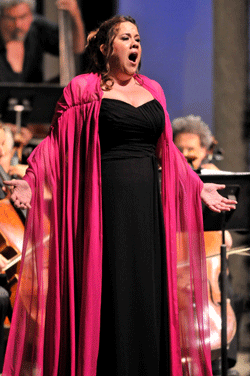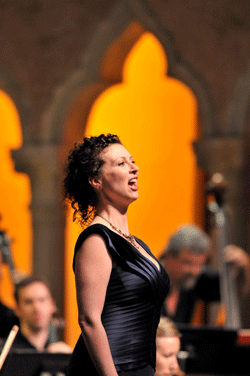One such festival is the Caramoor Music Festival of
Katonah, New York with its dedication to bel canto repertoire for its
opera portion. It is true that since its resurgence after World War II, at the
hands of Joan Sutherland and Maria Callas, bel canto opera is now
firmly ensconced in the repertoire. But do not be fooled. As Will Crutchfield,
the festival’s conductor, has previously stated, the goal of the festival is
to present the lesser known bel canto operas. To that end, the
festival is formatted such that one staple shares the stage with a more obscure
work. Last year, Donizetti’s evergreen, drunken revelry L’elisir
D’Amore was paired with Rossini’s majestic Semiramide.
This year, eyebrows were raised when Caramoor presented Rossini’s seldom
heard epic Guillaume Tell alongside Gilbert and Sullivan’s operetta
HMS Pinafore. True, HMS Pinafore does not belong to the group
of operas that we recognize as bel canto. Yet, according to an article
in the New York Times by Allan Kozinn, audiences fail to realize that
Arthur Sullivan held a job as a copyist in which he created reductions of
bel canto opera. As a consequence, he was well acquainted with
stylistic conventions, and his operettas can be seen as having evolved from
that tradition. Furthermore, Patrick Dillon, a writer for Opera News
argues that Guillaume Tell while a bel canto opera in the
strictest sense had far reaching effects in the creation and standardization of
French Grand Opera that lasted until the composition of Verdi’s Don
Carlo. In this way, the theme of this Caramoor season seems to be the long
lasting legacy of bel canto opera.
Regarding Guillaume Tell, I have nothing but good news to report.
It was one of those performances of which opera lovers dream. Under the
direction of the eminent Mr. Will Crutchfield, the orchestra of St. Luke’s
demonstrated all the drama and complexities of Rossini’s vast score.
 Julianna Di Giacomo as Mathilde
Julianna Di Giacomo as Mathilde
To
comment on their dynamics and flare for theatricality would be obvious; I was
most impressed with the dialogue between instrumental sections. If this were
one of Rossini’s Italian comedies such as L’Italiana in Algeri,
the opera would be full of ensembles in which the vocals lines would similarly
interact with each other. Here, however, I was impressed with Rossini’s
ability to transpose his skill for ensemble writing to the orchestra itself.
Additionally, the strings brought a mellow burnished quality to the music;
presenting a beautiful cohesive tone in a score with a plethora of strings.
The cast was in excellent form. Bass-baritone Daniel Mobbs, who sang the
role of Tell, gave a thrilling dynamic portrayal. He managed to cover all
facets of the character from revolutionary leader to husband and father while
singing with style and spell-binding tone. Much the same can be said of Mezzo
Vanessa Cariddi. Although, early on, her dramatic commitment to the role was
less apparent, it came beautifully into focus with the last act. However, it is
quite plausible that the reason for her character’s lack of substance lies
within the opera itself. Tenor Michael Spyres, in the role of Arnold, sang with
conviction and made his character a convincing case for the beloved operatic
trope of tenor-as-lover. He also sang the role’s astronomically high
tessitura with ease. Still two aspects of his performance should be mentioned.
Vocally, he seemed to get lost in passages of either high powered orchestral
work, or in ensembles. Additionally, he needs to develop a better physical and
emotional connection with the other characters. Soprano Julianna Di Giacomo was
incredibly compelling in the smaller but crucial role of Mathilde. Her deeply
lyrical soprano was a joy to behold. Her voice brought much appreciated texture
to the trio of Act IV with Mathilde, Tell’s wife Hedwige, and Tell’s son
Jemmy. Soprano Talise Trevigne was delightfully boyish as Jemmy, while Scott
Bearden was ferocious as Switerland’s Hapsburg governor.
 Vanessa Cariddi as Hedwige
Vanessa Cariddi as Hedwige
The Caramoor festival chorus was in full vocal throttle when they joined the
rest of the cast during the many ensembles. I could not help but smile at
Rossini’s overt attempts to incorporate the tastes of the Paris Opera.
It remains to be said that Caramoor is a beautiful setting. When an obscure
opera like Guillaume Tell is performed in such grand style and the
audience is treated to fresh air, and exquisitely perfumed gardens, the
question becomes, why isn’t this opera performed more often? My guess would
be size and expense. It is true that massive forces are required to perform the
work, and that according to Patrick Dillon of Opera News, the opera
has never been performed in its complete version in the U.S. Yet despite the
opera’s marathon four hours, this is an engrossing opera permitting time to
pass quickly. Therefore, I have to say that I would gladly see Guillaume
Tell again. And after all, isn’t that the goal of bel canto at
Caramoor?
Gregory Moomjy
image=http://www.operatoday.com/20110709Caramoor_9556.gif
image_description=Daniel Mobbs as Guillaume Tell and Talise Trevigne as Jemmy [Photo by Gabe Palacio courtesy of Caramoor Festival 2011]
product=yes
product_title=Gioachino Rossini: Guillaume Tell
product_by=Guillaume Tell: Daniel Mobbs; Mathilde: Julianna Di Giacomo; Arnold: Michael Spyres; Jemmy: Talise Trevigne; Hedwige: Vanessa Cariddi; Walter: Nicholas Masters; Rodolphe: Rolando Sanz; Fisherman: Brian Downen; Melchtal: Jeffrey Beruan; Gesler: Scott Bearden.
product_id=Above: Daniel Mobbs as Guillaume Tell and Talise Trevigne as Jemmy
All photos by Gabe Palacio courtesy of Caramoor Festival 2011